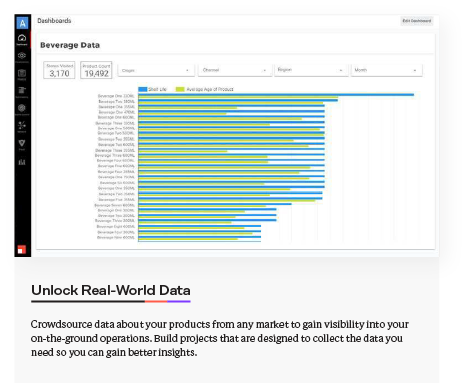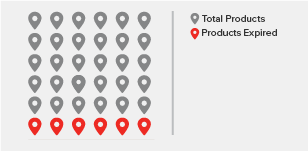Challenge
Most brands have very little data about how their products are sold and displayed in stores, especially in emerging markets, due to fragmented distribution chains. Any successful brand in the consumer packaged goods (CPG) or “fast-moving consumer goods” (FMCG) sector knows that innovation is the key to staying current with ever-growing supply chains.
Data allows CPG and FMCG companies to gain insight into their distribution chains, grow revenue, and delight their customers. One way to secure this data is through retail audits, which provide organizations with the insights they are missing from their information management chain. Retail audit data can provide the real world insights needed to create winning marketing and branding strategies.
For a multi-billion dollar brand whose products are distributed in tens of thousands of locations around the world, conducting audits independently is costly and inefficient, especially for long-term monitoring.
One leading global beverage brand came to Premise due to difficulty getting the data they needed to stay competitive. They had trouble auditing their products after they had been distributed in international markets, including Brazil.
When they came to us, their data was not answering a number of important questions, including:
- Are our products fresh and safe for consumption?
- Are our products regularly available to our target demographics?
- Are our products priced according to our desired pricing schemes?
- Are our products favorably located on the shelf and in stores?
- Are our products sold at the stores in which local distributors claim they are sold?
Additionally, the company was interested in understanding their performance on the above questions in comparison to their competition.
These questions are near-impossible to answer accurately without in-store data. While this can be done by contracting an external auditing firm, it would be logistically challenging and very expensive. Instead, the brand chose Premise because of our ability to get the needed insights quickly, cost-effectively, and accurately.
Solution
Premise and the brand decided to narrow the scope of the project to one country and a few major questions. The brand felt that many of the problems they were having were occurring in small towns and rural areas, where Premise does exceedingly well collecting data.
Leveraging the power of crowdsourcing, Premise mobilizes freelance smartphone users, whom we call Contributors, to complete tasks and provide insights from their own backyard. For this customer, our Contributor network across Brazil became, in essence, an army of part-time retail auditors.
We limited the scope to only checking the freshness and availability of the brand’s products in stores. Together, we used a list of where their products were supposedly sold and we designed survey questions to collect the data from those locations.
Contributors submitted survey results and photos of in-store conditions through our mobile app in return for payment. The data was aggregated from across the region and processed through our rigorous automatic and manual quality control and fraud prevention checks.


Findings
During the three months the project ran, we collected 16,683 submissions from 13 different regions in Brazil. From the expiration dates that were collected in stores, we used data from the brand to create an index of the freshness of each product. The visualization we created allowed the company to see how different stores and regions were performing, as well as specific products.
Overall, our data showed that 15% of the products on the shelf were expired. In 5% of cases, the product was not found in the store. One region accounted for 55% of all expired product and 35% of missing product.
Implications
By using Premise’s technology, the brand was able to quickly identify and fix problems occurring in stores across Brazil. Thanks to crowdsourcing through a mobile application, the brand was able to access deep insights in a timely manner, putting them in control of their customers’ in-store experience.
Even with this project addressing only one of the brand’s questions, Premise insights helped the customer identify serious discrepancies about the freshness and availability of their products. They became better equipped to make decisions and to enact a strategy to improve sales and increase market share.

Premise Capabilities
- Geolocation, Geofencing, GPS
- Route generation
- Dynamic tasking
- Localization
- Internationalization
- Multiple modes of data capture (photos, locations, SKU, sentiment)
Key Benefits
Gain a Competitive Edge
Develop market strategies with a holistic view of your products, customers, and competitors.
Improve Customer Experience
Use ground-level data to better understand your customers’ in-store experience and needs so you can better serve them.
Develop Targeted Campaigns
With on-the-ground insight, reach your customers where they actually are instead of where you think they might be.